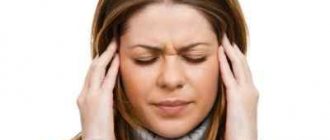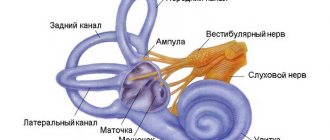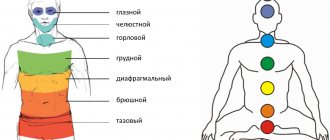Dizziness combined with weakness and nausea may indicate simple fatigue, which was caused by mental or physical stress. If these symptoms occur with regular frequency, then they can be considered as a signal from the body about some kind of trouble. In such a situation, you should not hesitate to consult a doctor.
Sometimes all three of these symptoms occur on their own, and sometimes in combination with each other. Sometimes, to get rid of discomfort, you just need to lie down and relax. If this measure does not help to cope with the ailment, then you need to contact a doctor and find out the cause of its occurrence.
What can dizziness be like?
Dizziness is characterized by the feeling that the person himself or the objects around him are beginning to move in space in a circle. True dizziness is a sign of diseases that are associated with impaired control of one’s own body position in space. Not only the vestibular apparatus of the inner ear is responsible for this process, but also joint receptors, organs of vision, muscles and bones.
True dizziness is divided into central and peripheral. If dizziness is caused by disturbances in the functioning of the brain, then it is central. When the head is dizzy due to damage to the vestibular apparatus of the inner ear, then such dizziness is peripheral.
Sometimes a person gets dizzy in certain situations.
These include:
If a person rides on a carousel or independently rotates around its axis, then it is quite logical that he will feel dizzy. Once the swing or body movement is stopped, the dizziness will go away.
Taking medications. There are a number of drugs that can cause dizziness. This unpleasant symptom is a side effect of some medications (information can be found in the leaflet for the medicine).
Low blood sugar. If a person is hungry, his blood glucose level decreases. This leads to the development of dizziness and increased weakness.
Emotional stress can cause an attack of dizziness. Sometimes a person's mind becomes clouded, his thoughts become confused, and he may even faint.
People perceive and describe dizziness in different ways. Sometimes, during a sudden attack, a person indicates that he cannot navigate in space. In some cases, a feeling of lightheadedness or alcohol intoxication is perceived as dizziness.
Video: dizziness and nausea:
Common causes of headaches
This symptom is perhaps the most common of all, and it is rare that a person has not experienced a headache at least once. This condition may be caused by the following reasons:
- disruption of blood supply to the brain;
- injury;
- osteochondrosis;
- taking medications;
- disturbances in the functioning of internal organs;
- tumor in the brain area.
The sensation of pain is vital for a person; a headache spreads along the nerve endings and requires immediate action to localize it. In some parts of the brain there are no pain receptors, so the body is not always able to notify about problems that have arisen.
Tension: physical and during severe fatigue and stress. Often the dynamic rhythm of work does not allow for proper rest, which leads to constant pain.
Gradually, a person gets used to being in this state, and the tangle of diseases that cause headaches grows, time passes and it becomes more and more difficult to untangle it.
You should not put off rest and stay in the fresh air indefinitely, attributing everything to lack of time. Without proper “recharging” the body is unable to function normally.
It is wrong to think that blood pressure rises and only then does a headache occur. Everything is exactly the opposite. We endure pain, and against its background the tonometer needle flies higher and higher, and if no measures are taken, a critical situation may arise.
It is impossible to cure a headache, since it is not an independent disease. You can only relieve the attack with painkillers, but the problem will not disappear.
it helps relieve stress and tension. If you ignore nausea and headaches, this leads to loss of concentration and decreased clarity of thinking.
For people whose work involves the need to spend most of the day sitting at a computer or driving, symptoms such as headaches and nausea are frequent companions.
This is due to the fact that in this position the muscles of the neck are pinched, and the spine in this area functions with disturbances. For prevention, it is necessary to periodically take breaks and do at least simple exercises for the muscles of the back and neck.
Migraines are also accompanied by nausea and have virtually no cure. This disease depends on neurological processes in the body and related diseases, and has no connection with intracranial or blood pressure.
If there are serious disturbances in the blood supply to the brain, a person’s complexion changes, nausea sets in, and this condition can be a harbinger of a stroke.
What are the reasons?
Dizziness combined with weakness and nausea can be caused by a variety of reasons. For example, this situation develops with a sharp increase or decrease in blood pressure.
Pregnancy is one of the most common reasons why a person develops dizziness and nausea. Discomfort occurs immediately after waking up, but may persist throughout the day.
People who often go on all sorts of diets and also limit their body to food of animal origin get dizzy.
Pathologies of the nervous system
A person suffering from diseases of the nervous system often experiences dizziness.
Many people feel weak, dizzy and nauseous from time to time. There are many reasons for the occurrence of such feelings: from banal food poisoning or ARVI, to serious pathological problems with internal organs. The first thing to do is to undergo a clinical examination to identify and eliminate the causes.
Pathological causes
Serious pathologies, the symptoms of which are frequent dizziness with nausea, include:
- VSD is a neurological disorder characterized by sudden changes in blood pressure.
- Osteochondrosis of the cervical spine. Provokes disruption of blood supply. In this condition, the hands go numb, the neck moves stiffly, and the head hurts.
- Hypoglycemia – a decrease in blood glucose levels leads to insufficient nutrition of brain structures.
- Anemia (anemia) - a reduced level of red cells in the blood leads to a lack of oxygen in the brain structures and the occurrence of symptoms such as dizziness, weakness, lack of appetite, nausea, pale skin.
- Meniere's disease is a pathology affecting the vestibular apparatus. The first sign of a dysfunction of the vestibular system is systemic dizziness, which in advanced cases can be accompanied by nausea and vomiting.
- ENT diseases – otitis media in chronic or acute form, labyrinthitis.
- Arterial hypertension - the described symptoms occur at the time of crisis, complemented by ringing in the ears, rapid heartbeat, and bursting pain in the head.
- Hypotension - abnormally low blood pressure is characterized by attacks of nausea, dizziness, sweating and weakness.
- Migraine – dizziness with attacks of nausea are common symptoms of an aura that occurs before a migraine attack.
- Intracranial hypertension - the accumulation of fluid in the brain tissue and its pressure on certain nerve endings can cause attacks of nausea and dizziness.
- Vertebral artery syndrome, which occurs as a result of the development of cervical osteochondrosis, leads to brain hypoxia and the appearance of unpleasant symptoms.
- Infectious damage to the brain and its membranes caused by meningitis, encephalitis (including tick-borne). The condition is aggravated by fever, severe vomiting, impaired consciousness, and unbearable attacks of headaches.
- Intracranial tumors - nausea and dizziness can be caused both by the pressure of the formation on certain centers, and by the toxic effect of cancer cells on all vital systems.
- Stroke is a serious condition in which there is a real threat to life or loss of vital functions with a low probability of their full recovery. In addition to severe dizziness and a feeling of nausea, a person at the time of an attack experiences vomiting, impaired speech and balance, and paralysis of the limbs.
Among the described causes of nausea with dizziness, it is important to identify the true one in order to take measures to eliminate it.
Physiological causes of dizziness and nausea in women, men, children
Dizziness is a condition of the body in which there is a loss of orientation in space, the appearance of illusions of movement in a stable, unchanged position of the body. It is often accompanied by nausea and general weakness.
The following factors can cause dizziness:
- The influence of drugs. Antibiotics have a similar side effect.
- Diet. Due to dieting, the body does not receive enough nutrients, which causes a feeling of weakness, especially against the backdrop of physical and psychological stress.
- Weak vestibular apparatus. Vertigo can occur after a short trip in any transport or active movement of surrounding objects.
The feeling of nausea, weakness and dizziness originates in the vestibular apparatus, and nothing more!
- Severe stress or shock, in which the process of blood flow to the brain is disrupted, causing oxygen starvation.
- Overwork. The head may feel dizzy due to poor sleep patterns, excessive exercise and chaotic eating.
- Meteorological reasons : magnetic storms and atmospheric pressure fluctuations.
LiveInternetLiveInternet
We are used to explaining sudden and unexpected dizziness by pressure surges. However, this is only one of the few factors that influence our vestibular apparatus.
We find out the causes of dizziness in women with normal blood pressure.
What to do? How to treat? Which doctor should I go to?
According to statistics, dizziness more often plagues the fair sex.
And this is not surprising - different hormonal levels, increased emotionality, pregnancy, childbirth, and the difficult course of the menopause.
And, of course, one of the most important factors is endless diets, in which the female body regularly does not receive the required amount of nutrients.
If an unpleasant symptom happened once, for example, when standing up suddenly or lifting heavy objects, there is nothing particularly to worry about.
If he pesters you on a regular basis, it’s time to worry about your health.
Dizziness - common causes in women with normal blood pressure, diagnosis and treatment
Dizziness is a condition in which it seems to you that space and objects in it are distorted, and an illusion of movement appears.
You hear tinnitus, suddenly sweat, turn pale, and feel nausea, sometimes accompanied by vomiting.
Dizziness causes women a lot of discomfort
The safest are short-term ailments - they can be triggered by overwork, chronic insomnia, and nervous tension.
As a rule, these conditions do not require any special treatment and go away on their own.
Much more dangerous are long-term dizziness, which:
- Accompanied by headache and vomiting
- Come along with muscle weakness
- Lasts more than half an hour
- Occurs against the background of hypertension or diabetes mellitus
The presence of two or more symptoms is a clear sign that you should seek the advice of a specialist.
Among the most common causes of dizziness in women, doctors identify:
Vertigo
A dysfunction of the vestibular apparatus, characteristic of both women and men of different ages.
The disease is accompanied by feelings of loss of orientation, nausea, cold sweat, and vomiting.
Vertigo accompanied by vomiting
An attack can last from several minutes to several hours and completely paralyze a person’s ability to move freely.
Inner ear inflammation
Labyrinth, otitis and other conditions that can cause the development of an unpleasant syndrome. They are usually accompanied by a high temperature and a general deterioration in health.
Development of iron deficiency anemia
The disease occurs with regular iron deficiency in the body, and develops in women during pregnancy, before and after menopause.
Vegetovascular dystonia
A disease in which there is a disruption of blood flow and the functioning of the central nervous system.
Cervical osteochondrosis
Pathological changes in the spine are one of the most common causes of dizziness in women.
In the presence of curved or deformed vertebrae, the carotid is pinched, a deficiency of nutrients occurs in the brain, as a result of which oxygen starvation occurs.
Tip: Disorientation in space, accompanied by nausea and vomiting, can also occur when taking certain medications.
The problem often appears during pregnancy
Causes of dizziness in young girls
Very often, dizziness with normal blood pressure occurs in women during pregnancy and menstruation. Let's consider the causes of these pathologies.
During pregnancy
This period is the most crucial in the life of a representative of the fair sex.
The young mother is undergoing serious hormonal changes; she needs more energy, because now she “works” for two.
A sharp drop in hemoglobin causes toxicosis. The problem increases many times over if the girl suffered from hypotension before conceiving the baby.
All these conditions require detailed discussion with your doctor and do not allow self-medication.
During your period
Dizziness during the menstrual cycle can be considered a variant of the norm, especially with heavy blood loss, causing the development of iron deficiency anemia. During this period, the amount of estrogen hormones increases.
During menstruation, dizziness is caused by large blood loss
For stress and anxiety
Surely you yourself have repeated the phrase a thousand times about all diseases that are caused by nerves. This is true.
Constant stress, anxiety, and severe psychologically traumatic situations disrupt blood circulation in the brain and cause oxygen starvation, against which dizziness develops.
For chronic fatigue
When you constantly don’t get enough sleep, don’t allow yourself to relax and are in a state of mental stress, loss of orientation in space will not take long to occur.
Advice: if for one reason or another you are forced to adhere to a diet, make sure that your diet is varied and contains all the vitamins and microelements necessary for the brain.
Dizziness in women with normal blood pressure - causes and treatment after 40 years
After 40 years, women's bodies experience serious hormonal changes.
Menopause sets in, the condition of the blood vessels and their ability to pump blood deteriorates, resulting in dizziness.
Especially often, loss of orientation in space occurs in the morning immediately after waking up when suddenly getting out of bed.
After 40 years, the symptom appears more often in the morning
Such conditions are often accompanied by vegetative-vascular dystonia, atherosclerosis, surges in blood pressure and require regular monitoring by a doctor.
Diagnosis and treatment of dizziness
If the problem did not happen just once, but has been bothering you for a long time, you most likely will not be able to get by with just a visit to a therapist.
Depending on your general health and concomitant diseases, you will need consultation:
- Ophthalmologist
- Gynecologist
- Otolaryngologist
- Hematologist
- Neuropathologist
Plus the necessary blood tests, ultrasound, x-rays, MRI, etc.
Be prepared to answer the following questions to the specialist:
- How often do you experience dizziness?
- How long ago has the problem appeared and what are its symptoms?
- What medications do you take on a regular basis?
- Are you susceptible to stress, what is your mental and emotional state?
- Do you have tremors?
If you feel dizzy frequently, consult a doctor
During the examination, the specialist should pay attention to your gait, skin color, the connection between your movements and body position, and conduct the Halmagi, Romberg and Dix Hallpike test.
The last three tests are very simple and are aimed at identifying the integrity of the vestibulo-ocular reflex and determining deviations in the functioning of the nervous system.
The doctor will ask you to sit or stand, turn your head, extend your arms and perform a series of movements that will allow him to draw preliminary conclusions.
Depending on the diagnosis, the doctor will select for you an option for drug therapy for the underlying disease that causes dizziness.
Or dizziness itself, if, for example, you are diagnosed with classic vertigo. And, perhaps, he will prescribe exercises for the development of the vestibular apparatus.
The most popular for the treatment of dizziness:
- Epley Gymnastics
- Samont maneuver
- Lempert method
Advice: in some cases, if the results of conservative therapy are negative, surgery is performed to restore the flow of information about balance.
Get outdoors more often. This is a great way to prevent dizziness.
Dizziness in women with normal blood pressure - prevention
In addition to regular monitoring by a specialist, every woman herself should understand the need to take careful care of her health.
In your power:
- Drink less strong tea and coffee
- Spend more time outdoors
- Eat healthy and varied
- Do not sit for several hours without a break in front of the computer
- Limit the amount of alcohol and stop smoking
- Take a contrast shower in the morning
- Eat less salt and sugar
- Get enough sleep and don’t stress over little things
Traditional medicine and treatment of dizziness
Simple and effective methods of alternative medicine will also help to cope with unpleasant symptoms or make their manifestations less active.
Eat properly and nutritiously
Let's look at some of them:
Tea with lemon balm
Helps fight vertigo, relieves fatigue well, and calms the nervous system.
Honey + apple cider vinegar
Add 2 tsp to a glass of boiling water. vinegar and 1 tsp. honey We drink it in the morning before breakfast. This same remedy works great for sudden increases in cholesterol.
Essential oils + massage
A light stroking massage of the neck and head with camphor, fir and juniper oils has an excellent effect.
Acupressure
Involves pressing on points located on the inside at the edges of the eyebrows and on the earlobes. Conducted daily for five minutes.
You will learn useful information about the nature and diagnosis of dizziness in women from the video below:
Source.
Source
Dizziness, weakness and nausea as a symptom of the disease
Nausea and dizziness can be either one-time or periodic; you need to determine the cause of the symptoms in order to understand what to do. If such sensations often bother you, this can be considered a marker of the development of some disease.
The most common causes of vertigo can be the following diseases:
- Whitening the central nervous system (brain tumors, circulatory disorders, physical injuries, migraines, stroke) and the peripheral nervous system (neuralgia and neuritis).
- Diseases of the inner ear: poor circulation, salt deposits, high fluid pressure, infectious lesions.
- Eye diseases.
- Poisoning. When intoxicated, many toxins enter the circulatory system, which travel to the brain and cause a feeling of vertigo.
Dizziness when taking medications, due to bad habits
It is also worth considering the fact that severe dizziness and nausea occur as a result of taking certain medications. Therefore, before taking them, you should not only consult with a specialist, but also carefully read the instruction leaflet, which indicates the side effects of taking the drug.
If dizziness and nausea only intensify during therapy, it is necessary to discontinue the drug or reduce the dosage, which is adjusted by the doctor.
Dizziness occurs due to taking:
- Sleeping pills.
- Antiallergic drugs.
- Tranquilizers.
- Oral contraceptives.
It should not be surprising that nausea and dizziness occur as a result of smoking or drinking alcohol. These habits negatively affect not only the condition of blood vessels and the heart, but also the activity of the brain and the body as a whole.
Stroke
You may often feel dizzy after a stroke and may experience nausea. This is caused by damage and death of cells in the lobe of the brain responsible for vestibular balance. Typically, vertigo is felt in any body position and is almost always accompanied by vomiting and speech impairment.
Nausea, dizziness, weakness (medical workers will tell you what to do if such symptoms do not stop) - these phenomena may be signs of a stroke. The patient should be urgently hospitalized to prevent the progression of the disease.
When vomiting occurs suddenly, without nausea, we can talk about a hemorrhagic stroke, in which significant bleeding occurs in the brain. The symptoms are similar to a concussion.
When discomfort is observed for a week, and then passes without consequences, we can talk about suffering a mini-stroke. In such cases, it is recommended to undergo diagnostics, since a recurrence of a micro-stroke or subsequently an ischemic stroke is possible. Timely medical care can prevent tragic consequences.
Drug intoxication and food poisoning
The symptoms of drug intoxication or food poisoning are significantly different, so it is much easier to recognize them. In case of poisoning, a feeling of nausea is observed until the body completely gets rid of toxic substances. Dizziness is characterized by a sharp increase in intensity at the first stage of poisoning, with a gradual decrease as recovery progresses.
The cause of dizziness is a protective reaction of the body, which tries to get rid of harmful substances as quickly as possible through vomiting, nausea, excessive sweating and diarrhea.
Due to the effects of toxins on the brain, there is:
With drug intoxication, blood stagnation occurs in the liver, which leads to loss of balance and coordination. It is necessary for the doctor to either replace the drug with an analogue, or stop the course of treatment, or prescribe protector drugs that protect the body and neutralize the negative consequences.
In case of food poisoning, it is worth cleansing the body by inducing vomiting, using an enema in the later stages, and also using absorbents. In case of serious poisoning, an antidote can be taken as prescribed by a doctor.
Additional symptoms: nausea, vomiting, fever and cold sweats
Typical imbalances are often caused by cerebellar lesions. It is difficult for the patient to remain in one position. When walking, he spreads his legs wide and swings his arms chaotically. In the severe stage, he cannot sit, stand, or hold his head up without assistance.
The vestibular form develops when one of the elements of the vestibular apparatus is damaged. Patients with encephalitis and cerebellar tumors suffer. Main symptoms:
- sense of rotation of objects;
- motion sickness;
- nausea;
- loss of orientation, dizziness.
The cortical form develops when the function of the fronto-pontocerebellar system is impaired. In addition to typical manifestations, the psyche changes, the grasping reflex weakens, and odors disappear. Causes of the condition: abscesses, problems with cerebral circulation. They also distinguish between kinetic, sensitive, and static ataxia with subjective symptoms.
Important! One of the dangerous symptoms is blockage of the auditory artery.
Thrombosis or embolism interferes with blood flow, causing severe pain, ataxia, noise, and loss of stability. With partial blockage, the patient suffers from high-frequency sounds.
The phenomenon is fraught with stroke and one-sided deafness. Attacks of Meniere's disease - dropsy of the endolymphatic space - are associated with impaired blood flow. Usually there is noise in anticipation of an attack. With chronic attacks, hearing decreases and the perception of individual sounds is difficult.
Vestibular neuritis occurs after infectious diseases. In addition to the classic symptoms, spontaneous rotatory nystagmus is observed with rotation of the eyes across and along the orbit. After treatment, the syndrome of incoordination disappears after 3 days.
After 60 years, vertebrobasilar insufficiency may develop. The disease is typical for people over 60. The causes of loss of balance are: cerebellar strokes, middle ear ischemia, problems with the vestibular nerve. Subjective signs: falls, nasal pronunciation of sounds, double vision.
READ MORE: Eye vitamins to improve vision: list, rating
Brain diseases
Vascular diseases of the brain are common causes of vertigo, which is caused by insufficient blood supply to the vestibular center. This occurs due to a decrease in blood pressure, which can lead to a sudden fall without loss of consciousness.
Multiple sclerosis often causes disorientation, accompanied by vomiting. With sclerosis, a sudden loss of balance may occur, especially when changing position, for example, if you suddenly stand up.
Tumors of different types and stages have different symptoms, but almost always their development is accompanied by dizziness, nausea and severe pain. An increase in the intensity of symptoms is associated with the growth of a tumor, which puts pressure on certain areas of the brain and interferes with normal blood supply.
Increasing severity of vertigo symptoms requires immediate diagnosis, this is necessary to detect the problem in the early stages.
Causes of dizziness
Among neurological and laryngological causes, which are closely related, we can distinguish between peripheral and central. Peripheral causes of dizziness include:
- trauma to the inner ear, such as temporal bone fractures, concussion of the labyrinth;
- inflammation of the labyrinth and vestibulocochlear nerve - this disease can be the result of complications from influenza. Dizziness, nausea and vomiting persist for several days. They are treated with antibiotics and steroids;
- vestibular atritis of the VIII nerve - most often viral, less often autoimmune or vascular. Symptoms develop over several hours and are associated with systemic dizziness with nausea, vomiting and imbalance. After 2-3 weeks, symptoms disappear;
- inner ear cancer;
- labyrinthine ischemia;
- Meniere's disease is the accumulation of fluid in the inner ear, which leads to sudden dizziness, as well as nausea and nystagmus. These symptoms are accompanied by a feeling of fullness in the ear, tinnitus and hearing loss. The illness lasts from several minutes to several days, dizziness increases with head movements, and decreases with closed eyes. As the disease progresses, hearing loss occurs. Meniere's disease is treated with diuretics, antihistamines and steroids. Sometimes surgery is required;
- labyrinthine otosclerosis;
- seasickness.
The second group of central symptoms includes:
Recommended by
Traumatic brain injuries
If, after a traumatic blow to the head or cervical region, a feeling of vertigo, nausea, or the urge to vomit occurs, we can talk about a traumatic brain injury (most often a concussion). Attacks of nausea can occur suddenly when turning the head, tilting back or to the sides.
Nausea, dizziness, weakness (what to do in each individual case should be considered by a doctor) - these may be signs of a head injury. If such symptoms are detected, it is worth conducting a brain tomography.
The slightest injury to the head can lead to hemorrhage, bruising of individual lobes of the brain, and damage to the skull, which are fatal injuries. Usually you can get by with a minor concussion.
To get rid of dizziness you need:
- follow a course of treatment with special medications;
- carry out therapeutic exercises;
- massage the cervical region;
- keep calm.
The total duration of drug treatment is 1-2 months. But if the feeling of nausea does not go away within 2 weeks, it is better to consult a doctor to adjust the course of treatment.
Treatment methods
It is important to start treatment promptly if attacks occur frequently or are of high intensity. The regimen includes several steps aimed at eliminating the cause and symptoms of headaches and dizziness.
- The first stage is relief of an attack of acute pain. For this purpose, analgesics, antiemetics, and antihistamines are prescribed.
- The second stage involves systemic treatment of the underlying cause of the attacks. The doctor will select a suitable regimen to support the functioning of the gastrointestinal tract, heart and blood vessels, and endocrine glands.
- For pathologies of the cervical spine, non-drug methods are effective. Treatment methods such as massage, gymnastics, and physiotherapy may be prescribed.
- For migraines, conventional painkillers do not provide relief. After confirming the diagnosis, the doctor will prescribe medications from the triptan group (sumatriptan).
- To restore balance, a set of exercises that can be performed at home is effective. It includes turning the head while stopping the gaze at a certain point, walking with eyes closed, and standing on one leg.
If you have a headache, feel sick, feel dizzy, or feel weak, you should definitely consult a doctor and start treating the problem. The Clinical Brain Institute offers comprehensive programs for diagnosing and treating headaches. Here you have the opportunity to undergo a full examination by experienced specialists and receive the most effective recommendations. Treatment takes place under the full supervision of general and specialized doctors, using new techniques and modern equipment.
Clinical Brain Institute Rating: 5/5 — 1 votes
Share article on social networks
Damage to the vestibular apparatus
Damage to the vestibular apparatus is always accompanied by a feeling of vertigo and moderate nausea.
Among the reasons for which it is worth highlighting:
- Physical trauma associated with a concussion, temporal bone fracture or cervical injury, which very often negatively affects the functioning of the vestibular apparatus.
- Multiple sclerosis , which over time affects the functioning of the vestibule due to problems with blood supply.
- Congenital pathologies. Many patients who complain of dizziness have congenital problems that cause the vestibular system to malfunction under increased stress. Such loads can be: rotation of the head or the whole body, driving a car or other vehicle, active movement of surrounding objects. Most often, such a pathology cannot be cured; for some it goes away over the years, and for others they suffer all their lives. The only solution is drugs that reduce the symptoms of dizziness, which allow you to travel long distances without consequences.
Dizziness and brain pathologies
In most cases, dizziness on only one side occurs due to the progression of a tumor in the brain. Diseases and pathologies of this area are also accompanied by other pronounced symptoms, which help to make an accurate diagnosis and prescribe effective treatment.
Fainting and pre-syncope are observed in patients with impaired blood supply to the brain. If a patient complains of psychogenic dizziness, this may indicate the development of neurosis or a depressive state.
If there are balance problems, we can say that the patient has damage to the spinal cord in the cervical spine. As a consequence, this leads to a disrupted connection that provides the brain with information about the position of the body. This deviation is diagnosed with osteochondrosis.
What to do if you feel sick, dizzy, or feel weak: first aid
The condition of vertigo requires mandatory diagnosis to identify the causes and treatment. You do not need to take any medications on your own, without consulting a doctor.
But first aid must be provided to a sick person, especially if the dizziness is intense, accompanied by loss of orientation and falling.
Nausea, dizziness, weakness - what to do to help a person:
- The patient must be placed on a flat surface to protect him from falling.
- To normalize blood circulation and increase blood flow to the head, you need to raise your legs.
- It is advisable to measure blood pressure.
- It is necessary to ventilate the room so that the victim has access to fresh air, after which you need to call a doctor.
If the patient feels weak, he should eat something sweet. Since often poor health occurs due to a lack of glucose in the blood. Glucose from food quickly enters the blood, relieving a person of the feeling of weakness.
What should a woman do?
If you feel dizzy
First aid must be provided:
- Lay the woman on her back. In this case, the shoulders and neck should be on the pillow to prevent kinking of the vertebral arteries.
- Ventilate the room, apply a cold towel to the patient’s forehead.
If there is water or wax in the ear canal
If water gets in, tilt your head to your shoulder (the side where it got stuck) and jump in place. You can also lie on the painful side, pull your earlobe down and wait 10 minutes.
To remove wax plug, you need to take a cotton swab and drip 2-3 drops of 3% hydrogen peroxide onto it. Then place the cotton wool in the ear canal for 0.5-1 hour so that the plug dissolves, and carefully remove it.
If your blood pressure has increased
When you simultaneously feel a headache, dizziness and ringing in the ears, you need to urgently measure your blood pressure even if the readings are above 200/110 mmHg. call an ambulance. Such symptoms indicate a high likelihood of a stroke.
Preventive measures
If you have high blood pressure, you should:
- follow a low-salt diet;
- reduce consumption of animal fats and sugar;
- avoid stress and sudden emotional overload;
- engage in moderate physical activity.
For osteochondrosis it is recommended:
- avoid physical inactivity (passivity in lifestyle);
- sleep on a low orthopedic pillow;
- visit a bathhouse or sauna to relieve muscle spasms in the neck;
- do yoga, swimming, walking more often
- Watch your posture while working at the computer.
For problematic periods you need to:
- sleep at least 8 hours a day
- watch your diet
In all three cases, you need to give up smoking and alcohol.
In any case, headaches, stuffy ears, dizziness, nausea, weakness and abdominal pain require professional diagnosis of the disease. Therefore, if your symptoms begin to worsen, your next step is to visit a doctor.
Diagnosis of the condition: laboratory and hardware methods
If you experience symptoms of vertigo, you should contact your family doctor. It is this specialist who can determine the primary causes and give a referral for consultation with a highly specialized doctor (ENT, therapist, ophthalmologist, neurologist or hematologist).
The family doctor prescribes it if the causes of vertigo are not associated with pathological diseases. If there is a suspicion of pathology of the vestibular apparatus, the patient is treated by a neurologist or ENT specialist, in case of anemia - by a hematologist, a therapist specializes in diseases of internal organs; in case of physical injuries, the patient will be referred to a traumatologist or surgeon.
Diagnosis of the cause of dizziness and nausea is carried out using the following methods:
- superficial examination;
- General and biochemical blood test:
- general urine analysis;
- X-ray;
- ultrasound examination of cerebral vessels;
- CT scan;
- electroencephalogram;
- cardiogram;
- MRI;
They allow you to accurately determine the causes of nausea, weakness, dizziness, and prescribe the most effective treatment.
Diagnostic methods
To understand why the patient feels sick, sick, and dizzy, a full examination should be performed. Various techniques are aimed at identifying hidden pathologies that require specific treatment. During the initial examination, the doctor collects medical history data. It is important to describe in as much detail as possible under what conditions the headache begins, how often attacks occur and how long they last. To confirm the diagnosis, the following techniques may be needed:
- first of all, measuring blood pressure; the patient is also recommended to monitor it at home;
- tests to check balance, including the Romberg test (deterioration in coordination of movements is manifested by staggering in a standing position, with eyes closed, feet shifted and straight arms extended forward);
- a general blood test will indicate inflammatory processes, as well as various types of anemia;
- blood test for glucose levels;
- heart examination, which includes ultrasound diagnostics and electrocardiogram;
- tests to assess hearing and visual acuity;
- X-ray of the cervical spine;
- study of blood flow in the vessels of the neck and head - a contrast agent is used for this;
- electroencephalography - analysis of the bioelectrical activity of brain cells;
- computer or magnetic resonance imaging is the most accurate, informative way to examine the brain, including soft tissues and blood vessels, which allows you to obtain a complete image of the affected area.
At the Clinical Institute of the Brain, you can undergo a complete diagnosis and determine the causes of nausea, dizziness, and headaches. The regimen is selected individually, based on the results of the initial examination of the patient. An experienced doctor will prescribe only those studies and tests that will determine the nature of the pathology. This is the most important stage in solving the problem, since the diagnostic results allow you to select the most effective treatment regimen.
Drug treatment of diseases
There are no specialized medications for the treatment of dizziness.
Among medications, two groups can be distinguished: those that relieve symptoms and those that affect the cause of symptoms.
Nausea, dizziness, weakness - in this case, doing anything on your own is not recommended. Very often, patients complain about migraines, in which narrowing of the blood vessels in the brain leads to weakness and dizziness. Painkillers and anti-inflammatory drugs are used to relieve symptoms. But it is almost impossible to get rid of migraine, so you can only stop the attack.
For pathologies of the inner ear, an ENT specialist may prescribe steroid medications. With their help, inflammation is localized and eliminated. When blood pressure increases, drugs that dilate blood vessels are prescribed.
A hypertensive crisis requires an immediate response; you can take medications yourself, before the doctor arrives, but only if you are sure that the cause of vertigo is high blood pressure.
Groups of drugs used, names of effective agents
In case of migraine, painkillers can be used, such as:
- Ibuprofen;
- Indomethacin.
In this case, to strengthen the blood vessels of the brain, you should use:
The following drugs are suitable for the treatment of pathologies of the inner ear:
People with high blood pressure can take:
To reduce the intensity of symptoms, you can use the following remedies:
- Cavinton - tablets that dilate blood vessels in the brain.
- Pipolfen - reduces the feeling of nausea, weakness, and prevents vomiting.
- Betaserc - eliminates tinnitus, increases body tone and prevents the occurrence of vertigo.
The above drugs have contraindications, so their use should be carried out only after consultation with a doctor. Not recommended for children, pregnant women, people suffering from liver disease and drivers.
Examination and treatment
Treatment of dizziness as a symptom is carried out using the following types of drugs:
- antihistamines;
- antiemetics;
- neuroleptics;
- anticholinergics;
- benzodiazepines;
- vasodilators.
These medications should only be used after consulting a doctor, since taking them incorrectly can slow down the compensation reaction. Therefore, a correctly prescribed drug subsequently will not have the desired effect.
Nonspecific vertigo is treated using alternative methods:
- manual therapy;
- vacuum therapy;
- physiotherapy;
- acupuncture.
If a medical examination does not reveal pathologies, treatment can be carried out on your own. First of all, it is necessary to change your lifestyle as much as possible towards a healthy one: get rid of bad habits, play more sports and breathe fresh air more often.
For a while, you can try to give up caffeine-containing drinks, including tea, replacing them with natural juices and herbal teas. It is also advisable to normalize the drinking regime.
Since problems of the vestibular system are caused by pathologies, it is necessary to eliminate the provoking cause. Treatment of coordination problems when walking begins with gymnastics. Movements help the vestibular system adapt to the existing pathology. The patient is asked to perform corrective exercises that irritate the receptors of the peripheral parts.
With repeated exercise, addiction occurs and the symptoms subside. To normalize blood circulation, the neurologist prescribes appropriate medications - Cinnarizine, Flunarizine, in severe cases - hormones, and massage is prescribed. However, it is not always possible to restore coordination.
The Latin term “coordination” translates as “coordination of actions or processes.” The very concept of “coordination of movements” means the process of interaction between the muscles of the body, which leads to the performance of certain actions.
Loss of coordination and dizziness when walking
The musculoskeletal system is controlled by the central nervous system. It controls the coordination of movements of the human body, thanks to it you do not need to make special mental efforts to perform this or that movement.
Folk remedies for dizziness and nausea
You can reduce the symptoms of vertigo using folk remedies, but you need to remember that they cannot replace full-fledged treatment. Such methods and means are recommended to be used as prevention. Better remedies are decoctions, herbal infusions, as well as natural juices from fruits and vegetables.
Medicinal plants can be collected independently in nearby meadows and forests, purchased in pharmacies or from grandmothers who collect them. You cannot pick plants near highways, industrial enterprises and agricultural fields treated with chemicals.
To make natural juices, you need to select only ripe products. At the same time, if fruits and vegetables begin to spoil, it is better to stop drinking juices from them. Since when rot develops, toxic substances spread throughout the fruit.
| Melissa | It helps greatly against dizziness; you should drink it like tea, infusing 1 tbsp. l. on boiling water. |
| Oregano | Used for a month, in small portions, several times a day. The infusion should be made in a thermos, pour 2 tbsp boiling water. l., leaving overnight. |
| Linden | Worth using together with mint and peony root. Leaves should be brewed in equal portions, usually 100 g each. Leave for about 10 hours. |
| Natural juices |
|
| Hawthorn | You can use hawthorn tincture as a warming agent before a neck and head massage. |
If you feel sick and dizzy regularly, you should rationalize your diet, completely give up bad habits (alcohol, cigarettes), take walks in the fresh air, and maintain a healthy sleep regime. At the slightest manifestation of more serious symptoms, such as vomiting and loss of consciousness, an urgent examination is necessary to identify a possible disease in the first stages of its development.
Article design: Mila Friedan
Video on the topic: Nausea, weakness and dizziness. Causes and what to do, treatment.
Dizziness. Treatment and causes:
You can count more than 80 diseases accompanied by dizziness and nausea. Sometimes this symptom is the main one, in other cases it accompanies and aggravates the clinical course of the disease, indicating the degree of involvement of internal organs and systems.
The origin of nausea, vomiting, and dizziness involves a reaction from the cardiovascular and nervous system, a specific lesion. Finding out the connection with other manifestations is much easier in an adult who understands what is happening to him, and difficult in a frightened child. We will look at the main causes and diseases in which these symptoms occur.
What physiological conditions cause nausea and dizziness?
Physiological causes of dizziness and nausea include hormonal changes that occur in women during pregnancy and menopause. In girls, signs appear with heavy menstruation. The body's sensitivity to moderate blood loss and lack of nutrition play a role.
Women complain of dizziness, weakness, and staggering when walking. If pain appears in the lower abdomen, you should urgently contact a antenatal clinic and find out the cause.
Vegetative-vascular dystonia is considered by some to be a physiological process, while others consider it to be a pathology. There is no doubt that all symptoms appear in adolescents and children. They are associated with hormonal fluctuations during periods of active growth. Schoolchildren often experience dizziness and fatigue. This also applies to young, impressionable women. No organ disorders were detected.
Dizziness and vomiting are a common reaction of the human nervous system to vibration and body vibrations in transport, in flight, at sea. People call it "motion sickness" or "sea sickness." Signs are accompanied by excessive salivation, headache in the temples, and sweating. Associated with low adaptive function of the autonomic nervous system.
Stressful situations - a normal reaction includes the release of catecholamines, which temporarily spasm the blood vessels of the brain. The condition returns to normal after rest and calming procedures. Hypoxia does not reach threshold values and does not cause circulatory disorders in neurons. With frequent repetition, the nature of the changes is disrupted. Vasospasm causes pathology.
Pregnancy
The first signs of pregnancy may appear several days before your missed period, especially in women with irregular menstrual cycles. As a result of a sharp hormonal change associated with a rapid increase in progesterone in the blood, the state of health slightly worsens.
Women want to sleep all the time, concentration decreases, and performance is impaired. Girls become whiny, irritable, their sense of smell increases, they experience morning sickness, and mild nausea during the day, provoked by strong odors.
Pregnancy can be diagnosed before a missed period using an analysis to determine the dynamic level of hCG. Many highly sensitive tests show a positive result 2 to 3 days before a missed period.
Symptoms of general malaise: weakness, nausea, dizziness and drowsiness are a kind of indicator of the state of the body. The persistent manifestation of such symptoms signals a possible pathology. Diagnosis of the body should begin as early as possible, without waiting for the development of various complications.











